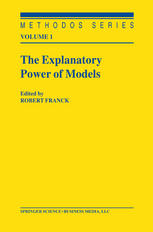

Most ebook files are in PDF format, so you can easily read them using various software such as Foxit Reader or directly on the Google Chrome browser.
Some ebook files are released by publishers in other formats such as .awz, .mobi, .epub, .fb2, etc. You may need to install specific software to read these formats on mobile/PC, such as Calibre.
Please read the tutorial at this link: https://ebookbell.com/faq
We offer FREE conversion to the popular formats you request; however, this may take some time. Therefore, right after payment, please email us, and we will try to provide the service as quickly as possible.
For some exceptional file formats or broken links (if any), please refrain from opening any disputes. Instead, email us first, and we will try to assist within a maximum of 6 hours.
EbookBell Team

0.0
0 reviewsEmpirical research often lacks theory. This book progressively works out a method of constructing models which can bridge the gap between empirical and theoretical research in the social sciences. This might improve the explanatory power of models. The issue is quite novel, and it benefited from a thorough examination of statistical and mathematical models, conceptual models, diagrams and maps, machines, computer simulations, and artificial neural networks. These modelling practices have been approached through different disciplines.
The proposed method is partly inspired by reverse engineering. The standard covering law approach is abandoned, and classical induction restored to its rightful place. It helps to solve several difficulties which impact upon the social sciences today, for example how to extend an explanatory model to new phenomena, how to establish laws, and how to guide the choice of a conceptual structure.
The book can be used for advanced courses in research methods in the social sciences and in philosophy of science.